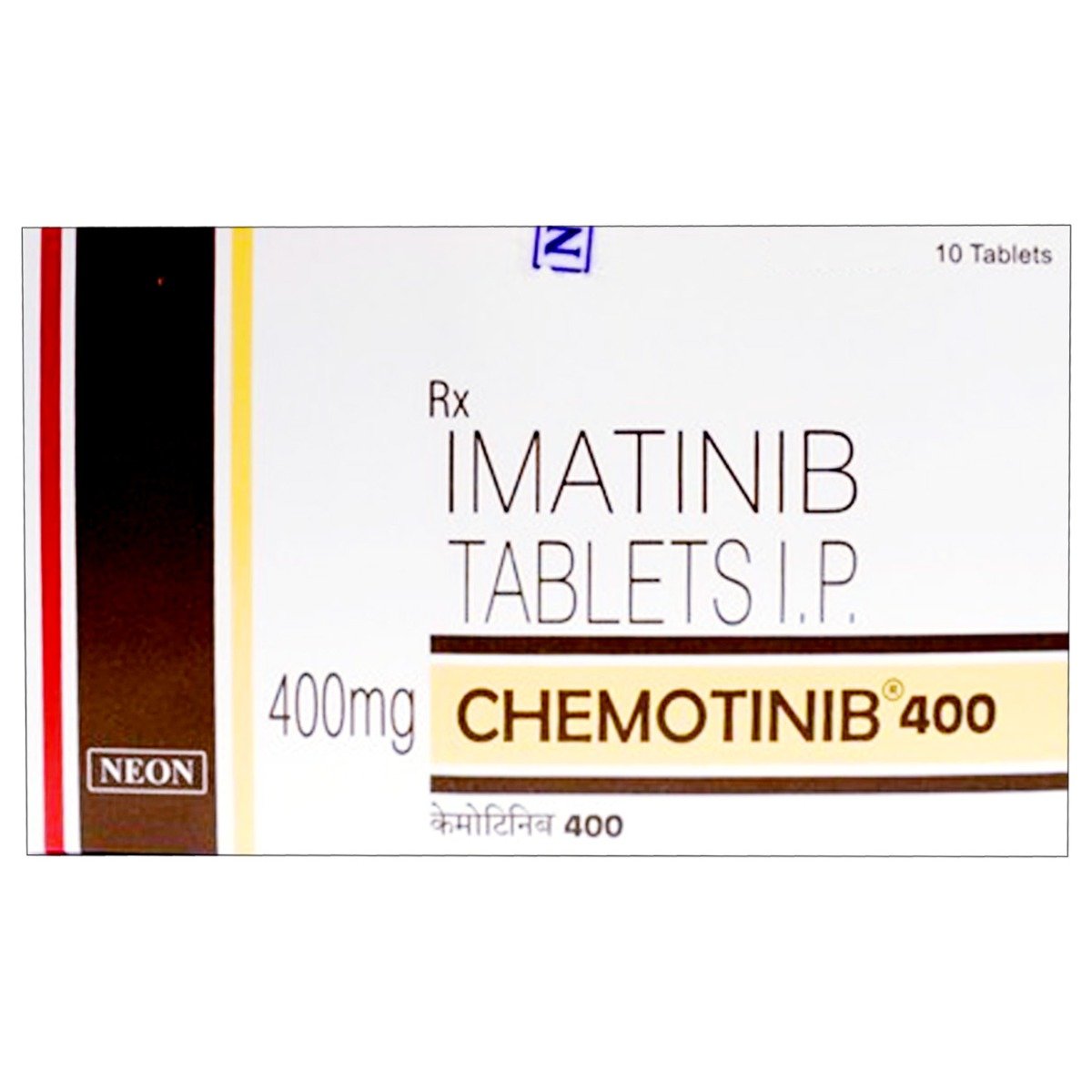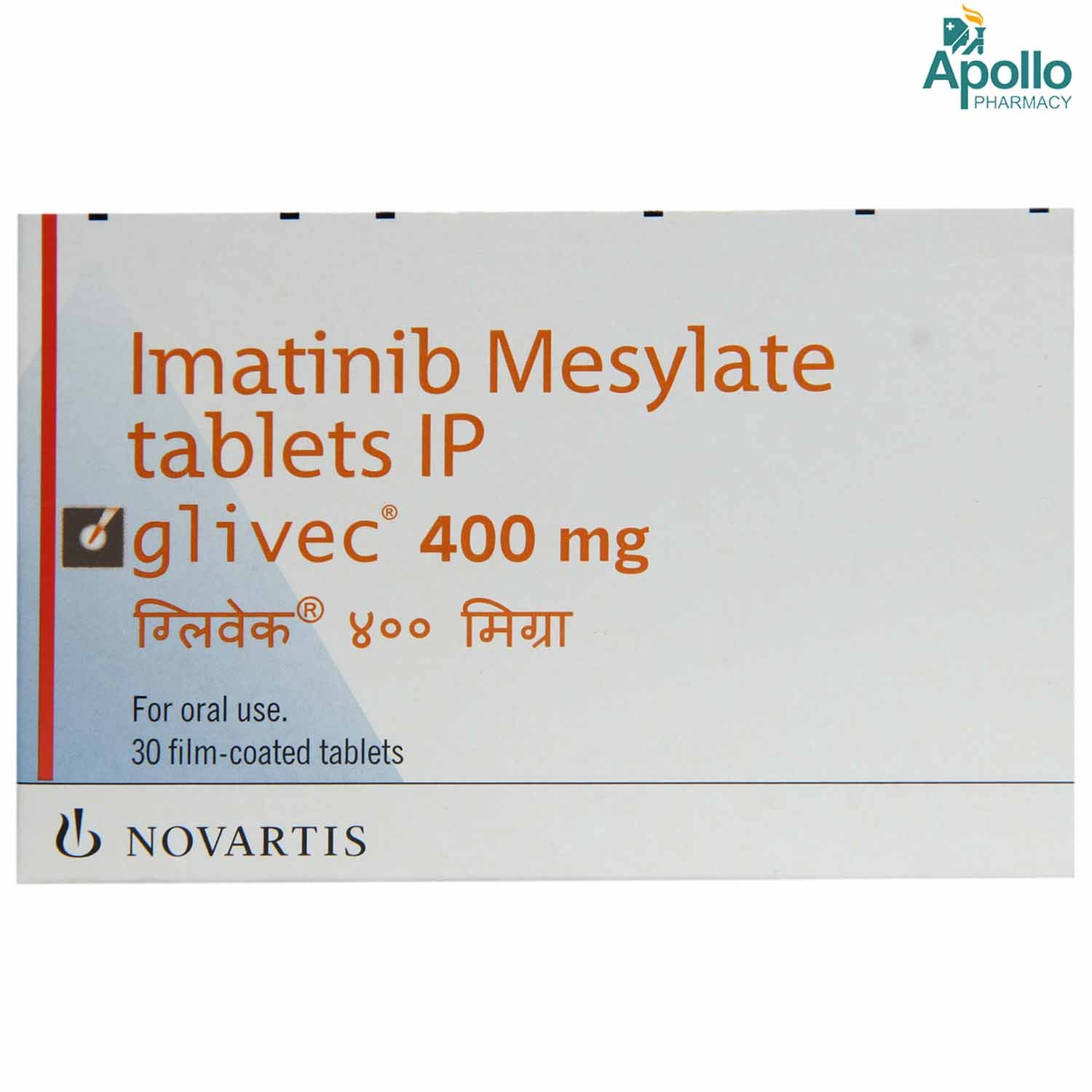Imatinib
About Imatinib
Imatinib belongs to a class of drugs known as 'anti-cancer medication', primarily used to treat various types of cancer. It is used to treat cancer of the blood (chronic myeloid leukaemia and acute lymphocytic leukaemia) and gastrointestinal stromal tumour. Cancer is a genetic change in which the cells divide uncontrollably and spread into surrounding tissues. There are more than 100 types of cancer, including blood cancer, lung cancer, breast cancer, etc.
Imatinib contains Imatinib, which is primarily used to treat cancer. It works by inhibiting an enzyme responsible for cancer cell proliferation and induces cell death (apoptosis). As a result, the growth and spread of cancer cells are stopped or slowed down.
You are advised to take Imatinib for as long as your doctor has prescribed it for you, depending upon your medical condition. In some cases, you may experience nausea, vomiting, oedema, fatigue, muscle cramps, musculoskeletal pain, diarrhoea, rash, and abdominal pain. Most of these side effects do not require medical attention and will resolve gradually over time. However, you are advised to talk to your doctor if you experience these side effects persistently.
Do not take Imatinib if you are allergic to any of its ingredients. While taking Imatinib, you might become more sensitive to sunlight, so it is important to protect your skin with a high sun protection factor (SPF). Regular blood tests are required to monitor liver function and blood cells in the blood while taking Imatinib. Imatinib can cause swelling and water retention, so if you have unexpected rapid weight gain, please consult your doctor. If you ever had a hepatitis B infection, please tell your doctor before starting Imatinib as it can make hepatitis B active again.
Uses of Imatinib
Medicinal Benefits
Imatinib belongs to a class of drugs known as 'anti-cancer medication' containing Imatinib, primarily used to treat various cancer types. It is used to treat cancer of the blood (chronic myeloid leukaemia and acute lymphocytic leukaemia) and gastrointestinal stromal tumour. It works by inhibiting an enzyme responsible for cancer cell proliferation and induces cell death (apoptosis). As a result, the growth and spread of cancer cells are stopped or slowed down.
Directions for Use
Storage
Side Effects of Imatinib
- Fatigue
- Nausea
- Vomiting
- Diarrhoea
- Muscle cramp
- Abdominal pain
- Musculoskeletal pain
- Oedema (tissue swelling)
- Rash
Drug Warnings
Do not take Imatinib if you are allergic to any of its ingredients. Imatinib may cause blurry vision and dizziness, so do not drive or operate any machinery which requires concentration. While taking Imatinib, you might become more sensitive to sunlight, so it is important to protect your skin with a high sun protection factor (SPF) while going out, as it can lead to a skin rash if you are not using a strong SPF. Imatinib can cause leg swelling and water retention (oedema), so if you have unexpected rapid weight gain, please consult your doctor. If you ever had a hepatitis B infection, please tell your doctor before starting Imatinib as it can make hepatitis B active again. Imatinib may make you more susceptible to infections; consult your doctor if you develop any signs of infections, fever, sore throat, breathlessness, jaundice, unexplained bleeding or bruising.
Drug Interactions
Drug-Drug Interaction: Imatinib is known to interact with blood thinners (warfarin, aspirin), anti-hypertensive medicines (amlodipine, metoprolol, nifedipine), heart medicines (quinidine, atorvastatin, lovastatin, simvastatin), immuno-suppressants (cyclosporine), antibiotics (erythromycin, telithromycin), anti-fungal medicines (itraconazole, voriconazole, ketoconazole), mental illness medicines (triazolam, alprazolam, estazolam, primidone, phenobarbital, phenytoin), anti-HIV medicines (saquinavir, ritonavir), erectile dysfunction medicine (sildenafil).
Drug-Food Interaction: Imatinib is known to interact with alcohol, St. John's wort plant (a natural remedy to treat depression), and grapefruit.
Drug-Disease Interaction: Inform your doctor if you have hypothyroidism (underactive thyroid), cardiovascular disease, bone marrow suppression, liver or kidney disease, fluid retention, gastrointestinal disorders, stomach ulcer or bleeding, high blood pressure, diabetes or chemotherapy.
Drug-Drug Interactions Checker List:
Safety Advice

Alcohol
unsafeAvoid alcohol consumption while taking Imatinib as it may increase drowsiness and lead to unpleasant side effects.

Pregnancy
unsafeImatinib is a pregnancy category D drug. It should not be used in pregnancy as it is known to cause fetal damage. Also, maintain a gap of 6 months between the last dose of Imatinib and your next pregnancy.

Breast Feeding
unsafeImatinib is known to pass through breast milk, and it may cause harm to the baby. So, it is advised not to breastfeed while taking Imatinib.

Driving
unsafeImatinib may cause weakness, dizziness and drowsiness. Do not drive or operate machinery unless you are alert.

Liver
cautionDose adjustment may be needed in patients with liver impairment. Please consult your doctor if you have a liver impairment or any concerns regarding this.

Kidney
cautionDose adjustment may be needed in patients with kidney impairment. Please consult your doctor if you have kidney impairment or any concerns regarding this.

Children
cautionThe safety and efficacy of Imatinib are not known in children. It should be taken only if prescribed by a doctor.
Habit Forming
Diet & Lifestyle Advise
- Maintain a healthy weight by performing regular low-strain exercises and eating healthy food.
- De-stress yourself by meditating, reading books, taking a warm bubble bath or listening to soothing music.
- Eat food rich in antioxidants such as berries, spinach, kidney beans, dark chocolate and high fibre content. Also, eat small and frequent meals for a speedy recovery.
- Avoid smoking and alcohol consumption. Also, avoid high fat and cholesterol diet.
Special Advise
- A regular blood test is required to monitor liver function and blood cells in blood while taking Imatinib.
- Always take it with food and a full glass of water to prevent nausea.
- Imatinib can cause swelling and water retention, so if you have unexpected rapid weight gain, please consult your doctor.
- While taking Imatinib, you might become more sensitive to sunlight, so it is important to protect your skin with a high sun protection factor (SPF) while going out, as it can lead to a skin rash if you are not using a strong SPF.
- Do not have immunisations with live vaccines (for mumps, rubella, measles and BCG, yellow fever and shingles or pox chicken) while you’re having treatment and for up to 12 months afterwards.
- Contact your doctor immediately if you experience any infection signs, including a temperature above 37.5 C or below 36 C.
Patients Concern
Disease/Condition Glossary
Cancer: It is a genetic change in which our cells divide uncontrollably and spread into surrounding tissues. There are two types of cancer: benign (localized) and metastatic (spread to the whole body). There are more than 100 types of cancer, including blood cancer, lung cancer, breast cancer, etc. Cancer growth can be prevented by chemotherapy (by strong antibiotics), radiation and stem cell therapy. To date, there is no cure for cancer.
Chronic myeloid leukaemia: It is a type of cancer that affects the white blood cells and tends to progress slowly over many years. It can occur at any age but is most common in adults around 60-65.
Acute lymphocytic leukaemia: A type of leukaemia (blood cancer) that comes on quickly and is fast-growing. In acute lymphoblastic leukaemia, there are too many lymphoblasts (immature white blood cells) in the blood and bone marrow.
A gastrointestinal stromal tumour (GIST): It is a type of tumour in the stomach or small intestine. The tumours develop into the specialized cells called interstitial cells of Cajal (ICCs).
FAQs
Imatinib contains Imatinib, an anti-cancer medication that works by inhibiting an enzyme responsible for the proliferation of cancer cells and hence induces cell death (apoptosis). As a result, the growth and spread of cancer cells are stopped or slowed down.
Regular monitoring of blood and urine tests and weight checks are required. An effective way of contraception should be used by both men and women while taking Imatinib.
Yes, you might become more sensitive to sunlight while taking Imatinib, so it is important to protect your skin with a high sun protection factor (SPF) while going out, as it can lead to a skin rash if you are not using a strong SPF.
In elderly patients taking Imatinib, the risk of side effects is more. For the elderly, dose adjustment might be required, or your doctor might prescribe any other medication safe for the elderly.
If you are having surgery, including dental surgery, please inform your doctor if you are taking Imatinib as your doctor might stop Imatinib before undergoing surgery.
Imatinib can make you more likely to get infections or may worsen any current infections. Avoid contact with people with infections that may spread to others (such as chickenpox, measles, or flu). Consult your doctor if you have been exposed to an infection or for more details.







